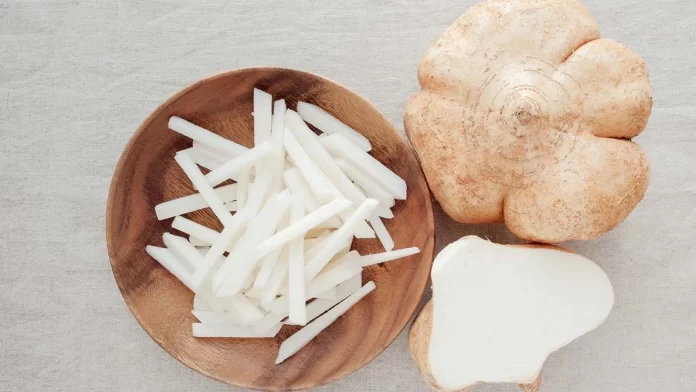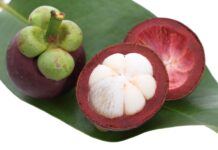7 Surprising Jicama Benefits. Root vegetables are important for health because they are loaded with minerals and nutrients that help manage weight, optimize digestion, strengthen the immune system, increase energy levels, and do many other things.
One root vegetable that deserves attention is jicama. It may also have the ability to help improve circulation, lower blood pressure levels, and boost brain function. It can also be a good source of calcium.
Table of Contents
What is Jicama?
Jicama (hee-Kah-mah) is a root vegetable that originated in central and South America and has been used for thousands of years. It may have a difficult name to pronounce (HEE-Kah-mah), but perhaps due to the difficulty pronouncing it, it’s also popular as a dietary element in many cuisines. Jicama is also called Mexican yam or Mexican turnip. The scientific name for this root vegetable is Pachyrhizus erosus.
Along with being heavily consumed in Mexico and other countries in Central and South America, jicama is also popular in many other parts of Asia, including China, Taiwan, India, Bangladesh, Pakistan and Thailand. This popular root vegetable grows best when the weather is hot and dry—in regions like Mexico and America where this occurs naturally.
Jicama Nutrition Facts
According to the USDA National Nutrient Database, jicama is a unique food because it contains a mix of vitamins, minerals, phytonutrients, and other organic compounds. These include dietary fiber, vitamin C, vitamin E, folate, vitamin B6, pantothenic acid, potassium, magnesium, manganese, copper and iron. In addition to these nutrients jicama contains a small amount of protein as well. Let’s take a closer look at this list to see how these elements give jicama its unique health benefits!
Health Benefits of Jicama
When it comes to health benefits, jicama can do a lot of things – including these:
Can Improve Digestion
When it comes to feeding the gut microbiome, one of the most important dietary compounds might be fiber. The Nutrients journal published a study that found that foods with high fiber content can help bulk up stool, which makes bowel movements easier and may help with conditions like constipation.
Furthermore, jicama may contain a soluble fiber called oligofructose inulin, which does not metabolize into simple sugars. This means diabetics can eat jicama without worrying about blood sugar fluctuation!
Might Boost Immune System
Jicama contains a lot of vitamin C. 100 grams of jicama (about 3 quarters of a cup) can give approximately 40% of the recommended daily intake. Vitamin C is an essential part of our immune system, stimulating white blood cells, which are the first line of defense against illnesses.
Vitamin C helps us battle bacterial, viral, fungal or pathogenic diseases. The study published in Cytotechnology Journal in 2014 found that jicama’s crude fiber and carbohydrates could have positive effects on the human immune system
Might have Anticancer Potential
Jicama can make your digestive system healthier, thanks to its dietary fiber content. Studies show that it has chemical properties that make it resistant to several conditions, including colon cancer.
It also contains antioxidants, such as vitamin C. While more research is needed on the link between jicama and cancer prevention in humans, additional studies have found that diets with a high level of antioxidants have been linked to lower rates of heart diseases.
Might Manage Blood Pressure
Potassium is essential for maintaining fluid balance in opposition to sodium throughout the body, thereby keeping our body hydrated and functioning at a high level.
This could be associated with improved heart health and stroke prevention. Researchers from the University of Alabama conducted a study in 2010 which maintains that an increase in dietary potassium and reduction in sodium could positively impact blood pressure decline.
Might Improve Blood Circulation
The significant amounts of copper and iron found in Jicama can make it good for the health of your circulatory system. These two minerals are important components of red blood cells; Adequate levels of them allow oxygenated blood to flow throughout the body. They also may, in some cases, prevent anemia.
Might Improve Brain Function
Vitamin B6 is linked to preserving your brain’s health and boosting your cognitive abilities. Jicama delivers this vitamin in high concentrations, and it also contains important amounts of Vitamin B6. Beyond the brain, that vitamin breaks proteins down into usable amino acids that can increase metabolic processes for use by various organs.
Might Strengthen Bones
Jicama can be a major bone-building nutrient because it is rich in minerals like manganese, magnesium, iron and copper. Bones are constructed of these minerals, so when they’re low in the body, new ones cannot form. Similarly, these cuts can heal bones that have been damaged by conditions like osteoporosis.
May aid in Weight Loss
As you try to lose weight, it can be important to choose low-calorie foods that are also rich in nutrients. For example, jicama only has 35 calories per 100 grams and is filled with water, fiber, and other notable nutrients.
It may keep you feeling full for longer so you don’t crave as much. It could also make for a good snack for focused dieters because it will provide the benefits of a regular meal without adding any extra calories or fluffing up your caloric intake.
Might Control Blood Glucose
Insulin resistance, a major cause of obesity, can be controlled and managed with the consumption of jicama as part of a healthy diet. A study conducted by a team of doctors in 2016 suggested that consuming jicama may increase insulin sensitivity and eventually lower blood sugar levels.
As mentioned earlier, the edible portions of jicama are its roots, but the rest of the plant is toxic and can’t be ingested. Other than that, jicama may be a healthy choice that will bring you many benefits!












